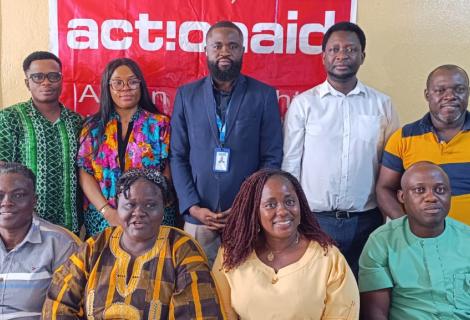Building Stronger Civil Society a New Chapter Begins!

Civil Society Organizations Capacity building
With the support of the Global Fund, Community-Based Organizations (CBOs) have long played a crucial role in strengthening Liberia’s health system. By offering essential services such as health education, HIV and TB testing, treatment adherence support, and community advocacy, these organizations have become trusted bridges between marginalized communities and the formal healthcare system. Their grassroots efforts foster trust and encourage health-seeking behaviors among populations who might otherwise face stigma, discrimination, or fear of punitive measures when accessing healthcare.
Recognizing the pivotal contribution of CBOs, the Global Fund’s Resilient and Sustainable Systems for Health (RSSH) grant seeks to further strengthen their capacity to respond to health challenges effectively. In a strategic partnership, Plan International Liberia engaged ActionAid Liberia to conduct a comprehensive capacity assessment and deliver targeted support to 32 CBOs across eight counties. This initiative reaffirms the Global Fund’s commitment to building inclusive, community-centered health systems that ensure no one is left behind.
To officially launch this transformative initiative, ActionAid Liberia, with the support of the Liberia Coordinating Mechanism (LCM), hosted an inception meeting today in Monrovia.
Delivering the welcoming remarks, William E. Walker Jr., Head of the LCM Secretariat, underscored the central role that Civil Society Organizations (CSOs) will play in driving activities under the project. He emphasized that the success of Liberia’s health interventions hinges on empowering and equipping civil society actors to lead change from the grassroots level.
Rev. Gabriel Starks, CSO Representative to the LCM, also addressed the gathering, warmly welcoming participants and noting that the meeting was "long overdue." He highlighted the civil society sector’s consistent calls for capacity development and expressed optimism that this new phase of engagement would help build a stronger, more responsive health system capable of meeting the needs of all Liberians. In his remarks, Rev. Starks further contextualized Liberia’s journey with the Global Fund, referencing previous funding models—NFM1 (focusing on TB and HIV), NFM2 (including the COVID-19 Response Mechanism - C19RM), and NFM3. He reinforced the importance of the Global Fund’s guiding principles: partnership, country ownership, performance-based financing, and transparency.
Dr. Momo Tegli, Deputy Chief of Party for the TB/HIV GC7 grants at Plan International Liberia, also delivered a statement emphasizing the importance of the training for CBOs. Dr. Tegli thanked the Global Fund for its steadfast support to Liberia and highlighted the critical need for ongoing collaboration between the LCM, the CSO network, and all stakeholders to ensure the effective implementation and sustainability of health initiatives across the country.
Dalitso Kuphanga, ActionAid’s Program and Policy Manager, delivered a comprehensive presentation during the meeting. He offered insights into the critical role of CBOs and CSOs in health system strengthening, detailed the transparent methodology for assessing and selecting organizations, and emphasized the participatory approach that will guide the entire process.
The inception meeting marks a significant step toward enhancing the capacity of Liberia’s civil society organizations to drive sustainable health outcomes. With strong partnerships, community leadership, and a focus on inclusivity and transparency, Liberia is poised to build a more resilient and equitable health system. As these initiatives take root, they will not only improve health service delivery but also strengthen community trust and participation in healthcare governance.